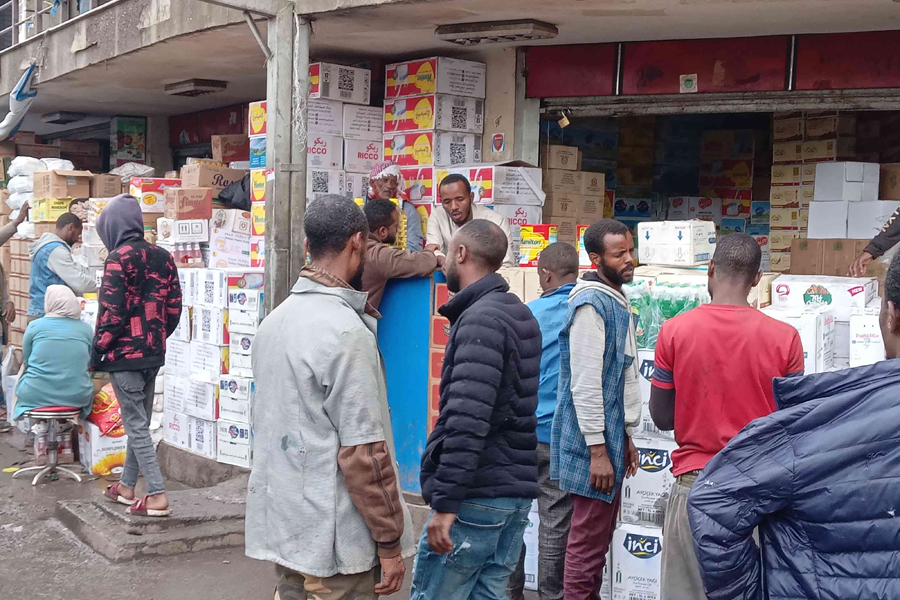
Fortune News | Aug 04,2024
As the sun sets and the cold wind starts to breeze, Birhanu Shambel, 29, goes out to work where he makes a living selling whole fried fish from his four-wheeled cart with a large frying pan instilled in it. He works on the streets of Ras Mekonnen Avenue in the Mexico area.
He moved to the capital a couple of years ago from Wolayta Sodo in the Southern Regional State in search of better opportunities. However, Birhanu did not expect the unfolding after he arrived as deep-frying fish in the streets was never the life he envisioned.
"I didn't choose this line of work," he said with a displeased look on his face as he flipped the fish around making sure it was well done.
The pungent smell coming from the cart is hard to go unnoticed with the oil on the frying pan looking darker than usual from repeated use. The pan is half covered with boiling oil giving Birhanu a hard time while moving his cart. He explained that the hot oil is the one thing he could not get accustomed to, showing the tiny dark spots on his hands that appear like nets of a jersey.
The junction route hosts residents of Addis Abeba from several directions returning home rubbing their palms from the cold weather while Birhanu sells his street food wearing a t-shirt that lost its originality from oil splashes. He claims to not mind the weather or ungroomed appearance as it is part of the hustle.
"My jacket is the heat from the pan," he told Fortune.
Birhanu gets his fish from distributors around the Piassa area for 150 Br a kilo and sells one piece from 70-100 Br depending on the sizes. He prefers to buy the ones making their way from Zeway and Arba Minch towns, known for their fish production.
Fried fish has gained popularity as street food in the capital over the years similar to the practice on the lakes lest the views. The former hub for the vegetable market, Atikilt Tera around the Piassa area, is only left with residues of its name now turned into a full-blown fishmongers spot.
Daniel Barega works at one of the distributors in the area, Tsige Fish. His daily routine for the past two years revolves around separating the unwanted skin from the fish holding a huge knife and selling a kilo of fish fillet (Filleto) for 200 Br.
"We use refrigerated trucks to transport the fish," he said. Restaurants are among his customers as Daniel observes the place becoming popular through the years.
Fried fish has gained popularity as street food in the capital.
The major fasting season for Ethiopian Orthodox followers, Abiy Tsom, which lasts for nearly two months, is a flourishing time for the fish industry, with restaurants and hotels in the capital stalking up their supplies.
In business for over six years, Nile Fish House on Roosevelt Street near Mexico in front of the Kuriftu Apartment Building. The Manager, Yoannes Getachew, said this is the season when customers come flooding through the door.
According to Yohannes, the price of tilapia (Ambaza) fish spiked from 40 Br a couple of years ago to 110-130 Br from the distributors. He believes the decreased supplies contribute to the rising prices and may challenge customers to come by as often as they would like.
The financial importance is not lost on consumers as is the nutritional value.
Ayalkebet Kassaye is a musician with a well-built body posture. He frequently visits the Nile Fish House, with the fasting season being one of the prominent times. He ordered the Nile special for 600 Br with his friend.
"The price is fairly equivalent to the meal," he said.
Ayalkebet observes the restaurant gets crowded over the fasting season. He claims the nutritional value compels him to frequent the restaurant even at other times.
The notion is somehow misleading for Zelalem Debebe (MD), a nutritionist who believes fish produced in Ethiopia has limited benefits compared to the ones in the ocean. According to her, the types used to produce fish oils containing nutrients such as Omega3 and vitamins are mainly found in cold temperate like Canada and the US.
Zelalem said it is still wise for people to substitute fish with meat at least twice a week as it has less fat and is relatively packed with more nutrients.
Landlocked Ethiopia is endowed with several water bodies with a fishery potential of over 94,500 tons annually, meeting about 10pc of the animal protein requirement of the population. The country has 12 major lakes, nine major river basins, and over 200 reservoirs that cover about seven percent of its land area.
However, the actual fish production is estimated to be around 50,000tns a year, which accounts for less than one percent of the gross domestic product (GDP) and less than 0.5kg per capita consumption.
Experts attribute the challenges to overfishing, lack of awareness and lack of infrastructure and technologies.
Alemayehu Abebe, a researcher at the Batu Fish & Other Aquatic Centre says overfishing and pollution of the rivers are attributed as the major problems for the underdevelopment.
"Waste materials dumped on waterbodies come at a high cost," he said.
According to Alemayehu, fishermen are untrained and nets are outdated leaving the big fish and catching the little ones before they get a chance to reproduce.
Although the low figure indicates that fishing is an undeveloped sector with much less contribution to the economy and livelihoods, officials mention the neglected fishery and aquaculture are slowly but surely getting attention.
According to the State Minister for Agriculture, Fikru Regassa, one of the largest reservoirs under study lies in Denbi Mini Hydro Electric Power plants in Bench Maji zone, in the Southwestern Regional State. It is estimated to have an area of 72 square kilometres and a fishery potential of 383tns a year.
The reservoir is hoped to support a small-scale fishery with 300 fishermen that use traditional fishing gear such as gill nets, hooks and lines, with species caught from the reservoir being Ambaza and catfish (Qoroso).
Fikru said they are utilising resources to ensure local demand and export to IGAD member states.
“We're partnering with member states,” Fikru said.
The distribution of fish species and overall diversity is extremely uneven. Although there are over 200 fish species in freshwater bodies, with 40 endemic, up to six types of fish are offered to the local market for consumption. Nile perch (NechAsa) and Qoroso are the most consumed species both in private and commercial settings.
More than 75pc of the fish produced in Ethiopia makes their way from Tana, Zeway, Langano, Awassa, Abaya and Chamo lakes. The remaining are from dams such as Finchaa, Qoqa and Tekeze.
While most of the fish comes from Oromia, Amhara and Southern regional states, riverine fishing activities are mostly performed on the Baro River in Gambela Regional State and the Omo River in the Southern Regional State near the border with Kenya.
The transportation issue and informal tax during checkpoints are a challenge for exporters in the business.
Birhanu Mebrhatu Fish Export, registered under a high-level taxpayer has been in business for over 15 years with 30 employees. The Manager Birhanu Mebrhatu has been recognised by the Addis Abeba City Administration, exporting 3,000 quintals of fish last year. He gets the Ambaza and Qoroso for 30-40 Br from the fishermen bringing up to 60 quintals a week. Yet the informal tax on the checkpoints until reaching the capital has been a headache, he said.
Birhanu said the rising prices and transportation issues coupled with the decreased demand in the international market are challenges faced by exporters and urges authorities to turn their heads to the sub-sector.
"The informal tax is killing the business," Birhanu told Fortune.
While low production, transportation headache and the inflationary price that comes with export ambitions grip the market, it has become a means to an end for many including street vendors like Birhanu on the streets of the capital.
PUBLISHED ON
Feb 25,2023 [ VOL
23 , NO
1191]

Fortune News | Aug 04,2024

My Opinion | Jun 21,2025

Commentaries | Oct 16,2024

Radar | Nov 11,2023

Commentaries | Jul 24,2021

Radar | Jan 14,2023

Radar | Jul 13,2024

Radar | Feb 13,2021

Fortune News | Jun 08,2024

Radar | Jul 02,2022

Dec 22 , 2024 . By TIZITA SHEWAFERAW
Charged with transforming colossal state-owned enterprises into modern and competitiv...

Aug 18 , 2024 . By AKSAH ITALO
Although predictable Yonas Zerihun's job in the ride-hailing service is not immune to...

Jul 28 , 2024 . By TIZITA SHEWAFERAW
Unhabitual, perhaps too many, Samuel Gebreyohannes, 38, used to occasionally enjoy a couple of beers at breakfast. However, he recently swit...

Jul 13 , 2024 . By AKSAH ITALO
Investors who rely on tractors, trucks, and field vehicles for commuting, transporting commodities, and f...

Nov 1 , 2025
The National Bank of Ethiopia (NBE) issued a statement two weeks ago that appeared to...

Oct 25 , 2025
The regulatory machinery is on overdrive. In only two years, no fewer than 35 new pro...

Oct 18 , 2025
The political establishment, notably the ruling party and its top brass, has become p...

Oct 11 , 2025
Ladislas Farago, a roving Associated Press (AP) correspondent, arrived in Ethiopia in...